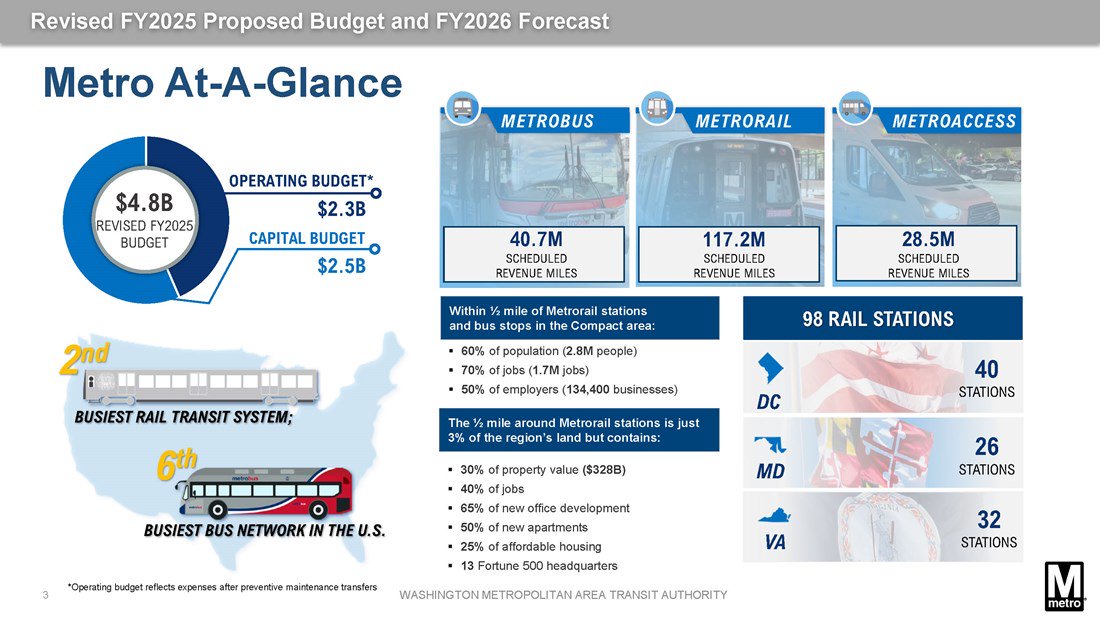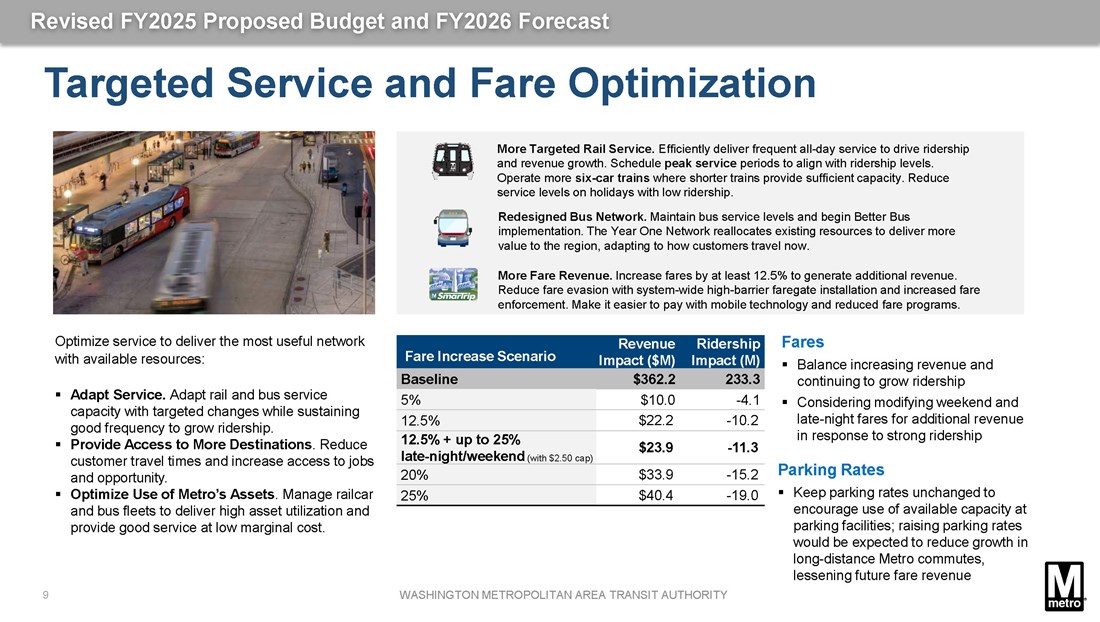Officials in metropolitan Washington agree—a robust, efficient transit system is essential for a thriving region. With the announcement of a looming fiscal deficit for the Washington Metropolitan Area Transit Authority (WMATA) due to federal transit relief expiring, costs rising with inflation, and ridership patterns changing following COVID, area leaders prioritized finding immediate and long-term solutions to the transit agency’s financial sustainability during COG’s leadership retreat in July 2023.
To analyze WMATA’s cost structure and forge consensus around a path forward, a workgroup of the region’s Chief Administrative Officers (CAOs) was convened through COG along with representatives of the governors of Maryland and Virginia and the mayor of the District of Columbia, developing eight near-term recommendations to support WMATA’s success.
The recommended actions, which include urging WMATA’s funding partners to increase their subsidies to the transit system and calling on Metro to increase revenues and cut costs further, have helped sketch out a regional roadmap to avoid major service disruption for Fiscal Year 2025. Leadership from the District of Columbia, Maryland, and Virginia have signaled their intent to provide additional funding for Metro’s upcoming budget cycle. Speaking to the COG Board at its February meeting, WMATA General Manager and CEO Randy Clarke thanked area leaders for their efforts in guiding regional collaboration.
“I really appreciate how close COG and Metro are working, not only on the financial topics but a lot of things. That can only bring more good things for our region, the more these two organizations work together,” Clarke said.

Clarke also shared that ridership levels continue to climb back to pre-pandemic levels, with February 6 seeing the highest levels of federal workers “tapping into the system” and the busiest 8:00 AM – 9:00 AM peak since the pandemic began.
He also noted several service-oriented strategies as recommended by the CAO Workgroup that are currently being implemented. Higher fare gates and increased enforcement have resulted in lower levels of fare evasion, and efforts by WMATA to evaluate and simplify its fare structure are also underway. Modernization and other improvements to bus and rail, including Metro’s Better Bus Initiative, aim to provide an improved rider experience and ensure the needs of all users are met.
More work needed to ensure long-term success of the system
While leaders seek to address the FY 2025 budget, the focus remains on continued coordination among stakeholders and additional commitments from jurisdictions to secure long-term financial stability for Metro.
Predictable, dedicated funding going forward will be key to achieving Metro’s vision as a world-class transit system, says Clarke. Currently, subsidy payments from Virginia and Maryland are capped at a 3 percent annual increase, a level that has not kept up with the rate of inflation and increasing operating costs. Based on recommendations in the CAO’s report, COG’s 2024 legislative priorities calls for state lawmakers in Maryland and Virginia to take legislative action to reset their levels of subsidy payments to Metro. The provision of subsidy payments from federal, state, and local funding partners for capital needs is also a priority to ensure financial sustainability for the transit system.
“This is a one-year solution. We’re going to have another challenge next year. Especially with the capital piece coming, we have to do some work to identify what a dedicated regional funding looks like,” said COG Board Chair and DC Councilmember Charles Allen, as he commended area leaders for their work thus far and committed the COG Board to continuing this crucial work in the coming year.

Federal telework levels play key role in understanding regional transit needs
In order to ensure Metro is able to meet commuter needs, it is essential to understand how the region’s largest employer, the federal government, is handling telework. Loren DeJonge Schulman, Associate Director for the U.S. Office of Management and Budget also presented to the COG Board and shared that the current goal is to achieve a 50/50 balance of in-person and telework for federal employees across all agencies. For several months, COG has advocated for an increased office presence for federal workers, recognizing the impact of these workers on the surrounding communities as well as regional transit providers as they work to respond to shifting commuter levels.
“The breakdown across the workweek of when they’re commuting and not commuting—it’s a real challenge to run a railroad when you’ve got to meet peak demand on Wednesday, and then they’re empty on Friday,” said COG Board Member and Fairfax County Supervisor James Walkinshaw, adding that “My ask for you all at the federal level, is that we have to find a way to more evenly disperse the days on which folks are working.”
Area officials also hope to see the federal government provide additional funding commitments for WMATA going forward and continue to engage with all stakeholders to pursue the identified strategies for ensuring a robust, efficient, and sustainable transit system.
“Where Metro goes, the community grows and thrives,” summarized Clarke.
MORE:
Metro Revised FY2025 Proposed Budget & FY2026 Forecast
Certified Resolution R10-2024 - Metro funding